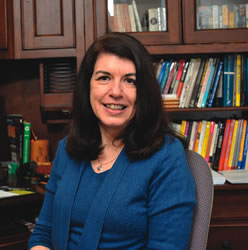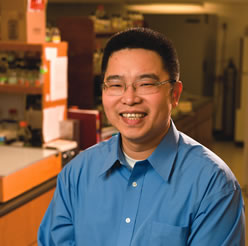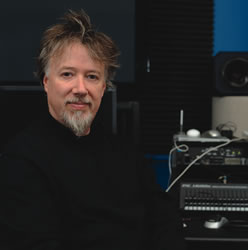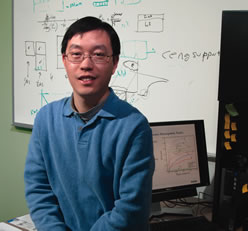Volume 19 - 2010



Science, Scholarship &
the Arts at the University of North Texas
UNT Research Home | Faculty Researchers
Faculty Researchers
Gaile S. Cannella
Professor of teacher education and administration and Velma E. Schmidt Endowed Chair
Gaile S. Cannella brought more than 30 years of research experience to UNT. She examines the unintended effects of societal public policies on young children, such as the increased numbers of children in poverty as a result of welfare reform, or children who have lost special education services due to federal regulations.

Photo by: Michael Clements
“Our research initiatives ask questions about who is helped and who is hurt from within our conceptualizations and implementations of public policy,” she says. “Sometimes we don’t realize the unintended results for children who are traditionally marginalized and their families. Poor children and children whose first language is not English are often labeled ‘deficient’ or ‘lacking’ because of their different backgrounds from within the policies that are created to ‘help’ them.”
Cannella, who joined UNT in fall 2009, began her work as a preschool and elementary teacher and child care worker. She has taught at Texas A&M University, Arizona State University and, most recently, Tulane University, where she explored the impact of disaster and neoliberalism on public schooling. She earned her bachelor’s and master’s degrees in elementary education from Tennessee Technological University and her doctorate in early childhood education from the University of Georgia.
The author and editor of multiple books, she also co-edited two special issues of Qualitative Inquiry that critiqued the National Research Council's narrow definition of scientific educational research. Her research methods work focuses on research ethics and the use of critical qualitative methods to address social issues.
She will continue her interdisciplinary approach at UNT with its new Immigrant Research and Policy Center, working to address children’s issues that involve multiculturalism, linguistic diversity, migrant worker children, and women and gender studies.
“UNT’s diversity and emergence as a major research university is exciting and I’m glad to be part of it,” she says.
Qunfeng Dong
Assistant professor of biological sciences and computer science
Developing computational solutions for biological problems is one of Qunfeng Dong’s specialties. The former bioinformatics director of the Center for Genomics and Bioinformatics at Indiana University joined UNT’s developmental physiology and genetics research cluster this spring.

Photo by: Jonathan Reynolds
“Biology these days has lots and lots of data, and it takes months or years to compute,” Dong says. “In the past, there was not as much to analyze because researchers were not able to access information as quickly. Nowadays, it is impossible to analyze it all manually. We need computer programs to process it.”
Dong, who earned his bachelor’s degree in biochemistry from Wuhan University in China and a doctorate in biochemistry from Iowa State University, began studying computational biology as a post-doctoral student. His experience includes work as the project manager and a founding member of the National Science Foundation-funded Plant Genome Database team. He designed many of the core functions of the resource, which contains scientists’ knowledge of plant gene composition.
At UNT, Dong will begin work on three projects recently funded by the National Institutes of Health that involve analysis of DNA sequence data and the development of bioinformatics software. In two of the studies, he will investigate known and unknown bacteria associated with sexually transmitted diseases and HIV infections, searching for better treatments. In the third project, he will develop software that uses super computers to turn large amounts of raw sequence data into meaningful biological information.
Dong says the opportunity to work with students in the fields of biology, computer science and mathematics drew him to UNT.
“Many schools do not let you interact with students from other departments,” he says. “UNT is making this integration easy for me.”
David Stout
Professor of composition studies
David Stout is opening up doors between the arts and technology. A noted live-cinema performer, he gives cutting-edge interactive performances using computers to create virtual images that emit sounds.

Photo by: Michael Clements
Stout, who joined UNT in fall 2009, is the first faculty member hired specifically for the interdisciplinary research cluster known as the Initiative for Advanced Research in Technology and the Arts (iARTA). As a faculty member in the College of Music, Stout is using his varied expertise to help students discover new and unexpected ways to integrate arts and technology across multiple disciplines — whether music, dance, theatre, film or visual arts.
“Being part of iARTA is a unique opportunity for me to combine research, teaching and exhibition as a means to nurture a creative community across the arts and sciences,” he says.
For four years, Stout and New Mexico artist Cory Metcalf — the other half of his performance duo called NoiseFold — have presented live concerts using computers loaded with a database of mathematical equations gathered from astrophysicist Paul Bourke. Stout and Metcalf use ambient sound, their hand motions and foot pedals to channel information into the computers during a performance. That information triggers and remixes the mathematical equations, which churn out complex 3-D images displayed on screens above them. Those images create musical sounds — but the artists never know exactly what to expect.
“The computer becomes a third performer,” Stout says. “As we move toward an artificial machine intelligence, this field is going to be of even greater interest to performers and installation artists.”
Before joining UNT, Stout served as professor in the Department of Moving Image Arts at the College of Santa Fe. Previously, he was a professor in the video department at the Savannah College of Art and Design and served on the faculty of the California Institute of the Arts.
Zhiqiang Wang
Assistant professor of materials science and engineering
Zhiqiang Wang — a computational materials scientist who joined UNT in fall 2009 to focus on mesoscale technology — says understanding the smallest electrons helps determine the behavior of materials on the largest scale.

Photo by: Mike Woodruff
“The mesoscale is between the microscale and macroscale, and while there has been a lot of work at the two extremes, more work is needed at the mesoscale to understand how to connect the two,” he says. “We are doing computational simulations of material microstructures, seeing how they evolve.”
Wang earned his bachelor’s degree in mechanical engineering from the University of Science and Technology of China and his doctorate from UCLA. He was a post-doctoral research associate at Los Alamos National Laboratory before coming to UNT. At Los Alamos, he worked on material deformation related to energy and nuclear weapons. His research interests include computational nano/micro mechanics and mesoscale modeling of materials — specifically, dislocation dynamics, involving line defects in materials, and high performance parallel computing.
“My objective at UNT is to make models that are more accurate so we can predict properties and help design better materials such as alloys used in the aerospace industry that are stronger, lighter and corrosive resistant. I’m also studying hydrogen materials for future clean energy solutions such as radiation and nuclear reactors,” he says.
Wang says strong computational collaborations at UNT, such as the Institute for Science and Engineering Simulation and the materials modeling research cluster, together with the top-notch facilities at the Center for Advanced Research and Technology and the Center for Advanced Scientific Computing and Modeling, attracted him to the university.
“It’s very exciting to be here,” he says. “I like conducting research — using scientific knowledge to develop technology that can advance science and the economy.”
Departments
President's Note
"Leading the pack" for innovative changes
Initiatives
National research status, new senior faculty
Awards
Top engineers, chemists, Fulbright specialists
News Briefs
New clusters, plant defense, Nature research
Faculty Researchers
Experts in children’s issues, bioinformatics, interactive performing, mesoscale technology
Student Researchers
Exploring tribal archives, corporate fraud, nanoscale circuits, international politics
Faculty Books
Spanish language media, math, Arab art
End Note
Investing in research
Web page last updated or revised: January 27, 2010
Questions or comments about this web site? urcm@unt.edu
"University of North Texas," "UNT," "Discover the power of ideas" and their associated identity marks, as well as the eagle and talon graphic marks, are official trademarks of the University of North Texas; their use by others is legally restricted. If you have questions about using any of these marks, please contact the Division of University Relations, Communications and Marketing at (940) 565-2108 or e-mail branding@unt.edu.